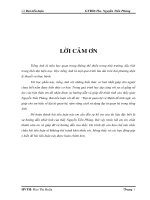Tiểu luận tiếng anh the achievements and limitations of vietnams stock market
Bạn đang xem bản rút gọn của tài liệu. Xem và tải ngay bản đầy đủ của tài liệu tại đây (96.01 KB, 13 trang )
The achievements and limitations of Vietnam's stock market
VIETNAM'S STOCKMARKET
Prefrace
Vietnam’s economic growth rate has been at 7-8 percent in recent
years, and in 2005 the rate up to 8,4 %. These rates are considered to be
among the highest in the world. Therefore to maintain the above rates is a
difficult question to the Government. One of the effective ways is to raise
capital, besides ODA (Official development Assistant) or FDI (Foreign
development investment), the other medium and long- term capital we can
expect is stock market. So what we have got here not only the funds of
organization but also individuals' money.It can be denied that nowadays
VN's stock market is an effective kind of investment and it also receives a
lots concerns.
Vietnam's stock market was founded in 2000 after a great deal of the
Government's effort. June 1995, the Prime Minister - Vo Van Kiet signed the
dicision number 361/Ttg about the set-up of "The bureau of Preparation for
organizing the stock market". From then on people responsible for this
project worked hard . The State Securities Commission (SSC), was
established in 1996, is responsible for capital markets development,
licensing of participants, and the issue and enforcement of regulations. The
Stock Trading Center of Vietnam (STC), located in Ho Chi Minh City, was
officially operated on July 20, 2000, and trading launched on July 28, 2000.
1
The achievements and limitations of Vietnam's stock market
Initially, just two equities were Refrigeration Electrical Engineering Joint
Stock Corporation (REE) and Saigon Cable and Telecommunication
Material Joint Stock Company (SACOM). Up to now, there are 56 equities
and bonds with the total value of 3.5 billion USD.
After a long time existing and developing, Vietnam's stock market is
surely to be proud of its achievements but there are a lot of limitations and if
we don't solve it step by step, the stock market can be failed in one day like
the financial crisis in Asia in 1997 in Songapore, Hongkong, Korea and
other countries.
I. About Vietnam's stock market:
1. What is stock market ?
1.1 Definition of stock market:
It is easy to understand that stock market is a place where parts of the
ownership of companies are bought and sold, or the organization of people
whose job is to do this buying and selling.
1.2 Other acknowledge concerned:
2
The achievements and limitations of Vietnam's stock market
(Over- the-counter) OTC market is securities market that is conducted
by dealers throughout the country through negotiation of price over the
phones rather than through the use of an auction system as represented by a
stock exchange. However, once the deal has been reached, the transaction
may be put through the exchange for clearing and settlement process.
Capital market is the broad term for the market where investment
products such as stocks and bonds are bought and sold. It includes all the
people and organizations that support the process. Capital market, in general,
refers to the market where the securities maturing in more than a year (longterm) are issued and traded.
Brokers are the financial institution or its sales representatives, who
advise clients how to properly invest, educate their clients what is the current
market situation, including rules and regulations, and finally take and excute
your buy or sell orders.
The primary market: The first buyer of a newly issued security buys
that security in the primary market. All subsequent trading of those same
securities is done in the secondary market.
Secondary market: The market where securities are traded after they
are publicly offered in the primary market. Most activities occur in the
secondary market.
3
The achievements and limitations of Vietnam's stock market
2. Some functions:
Vietnam's Stock market has a lot of functions but according to me, for
two main functions. The first is to enable the current private shareholders to
sell some of their shares to gain money. The aim of these companies may be
to raise money to expand the company. In this case, rather than selling their
own shares, the owners will issue new ones to the public: they will then own
less of the company, but the company as a whole should be worth more due
to the new addition of cash that can then be invested.Companies are not
limited simply to raising money on the stockmarket once. But firms don’t
always come to market for cash just to fund expansion : they may also need
the cash to prop up their finances to avoid business failures.The second is to
make profit by buying and selling the shares of the investors. Two main
functions
3. How a company can be listed
In order to be listed in Vietnam's stock market, a company must have
been profitable for at least 2 years, have a minimum capitalization of
VND5billion (approximately 318,000 USD), and have at least 50
shareholders who are not employees of the company, holding at least 20% of
stake. Foreign invested joint venture companies are on basis qualified to list,
but in order to do so, they must be reorganized into joint stock company
4
The achievements and limitations of Vietnam's stock market
status. Companies intending to list must also submit to audit by an approved,
independent auditing company.
II.The achievement of Vietnam's stock market
It must say that Vietnam's stock market has achieved the high target
which is developing a stock market from low level to high level without
causing any problems to the economics. The initial achievements gained
after 6 years operation as following:
Firstly, Vietnam's stock market have opened a securities transactions
market operating succesfully with safe sessions. Thanks to this, investors,
enterprises, Securities Trade Centers and management agencies could draw
valuable lessons in operating and organizing stock market. Vietnam has also
had some blue chips in the stock market like FPT, Vinamilk, Sacombank,
and Vinhson- Songhinh. These Companies have helped the local stock
market's growth rate. The capacity of STC is 300,000 orders per day.
Particularly, Year 2005 witnessed a stable growth of Vietnam stock
market. The total trading value of listed bonds was 38.122 billions VND,
equaling 4.9% of GDP, and listed stocks gained 9,356 billions VND,
equaling 1.2% of GDP (value of both securities trading centers in HCMC
and Ha Noi). The VN-index reached 237.23 points in the early year and
308.8 points at the end of this year. In March 2005, Ha Noi Securities
Trading Center became operational as the second one in Vietnam.
5
The achievements and limitations of Vietnam's stock market
Secondly, Vietnam's stock market have built up a system of intermediate
organizations working in stock market, comprising of 13 securities
companies ; 4 fund management company; 4 deposit banks, of which 3 are
foreign banks and 1 is nominated bank for payment of securities
transactions; 8 auditing organizations permitted to audit securities issuing,
listing organizations and securities companies. Besides that, The strong
inflow of new investors shows that the market is no longer the playing field
of big investors and professionals alone. It is estimated that about 1% of the
investors are institutional investors, the rest are individuals.
Thirdly, The market became more heated after Government’s decision
to increase the maximum stake owned by foreign investors in listed
companies from 30% to 49%. So far the number of investors has been up to
more than 60,000, double the total number counted at the end of 2005 and
20 times higher than the first year of the market's foundation. Up to now, the
total capitalized market value including bonds has made up more than 10
percents of gross domestic product (GDP), in line with projections of the
2010 local market development strategy 10. The total capitalized market
value of stocks now reaches nearly 5 percent of GDP, 2 – 3 percent higher
than the projected level of GDP in 2006.
Fourthly, management activities of the State management and market
members have been increasingly improved. The Government much care
about the laws and regulations to guide the Vietnam's stock market
participants more smoothly like the Decree No. 144/2003/ND-CP
substituting to the Decree No. 48/1998/ND-CP on securities and securities
6
The achievements and limitations of Vietnam's stock market
market and MOF’s promulgation of respective guiding circular have made
the market management simultaneous. International standards of audit and
company administration on the basis have been applied. Intermediate
organizations has brought into play their roles in market building and
investment consultancy. The Law on National Security was issued after the
stock market in 2006, and it came into effect one year later
The latest news, On November 2006, the stock market saw the first
positive effects from the official WTO entry of Vietnam as the 150 th member
of this organization. Foreign investors spent up to $2.5 million, higher than
3.3 times in the previous trading session, raising the trading proportion of
the entire market 15-20 percent. Especially, the event on November 20 th that
the United States President- Gorge William Bush visited The Stock Trading
Center of Vietnam (STC) made a progess in attracting the foreign investor
into Vietnam. The appearance of the President arised from VN-Index
increased of 10.47 points, up to 587.26 points. Overall, there are 4,300
orders placed at each trading session in the HCM City Securities Trading
Center at the same day, as compared with about 1,000 per session in
2005.The same effect has seen when the share price of FPT, an IT company,
jumped 14 times against face value after Bill Gates' recent visit to viet nam..
Vietcombank Securities now has more than 12,000 accounts, Bao Viet
Securities 8,000 and Saigon Securities over 7,000. The value in each trading
session has soared several times, reaching hundreds of billions of dong as
compared with tens of billions previously.
III. Limitations of Vietnam Stock market:
7
The achievements and limitations of Vietnam's stock market
1.Lack of information:
One of the major problems in Vietnam's stock market is the lack of
information, both the quality and quantity of information provided by the
trading center. Most of the investors often complain about the source of
information is extremely poor. Market information merely provides some
figures concerning the highest or lowest prices, the amount of orders, totally
trading volume of the preceding session, and so on. They quip that all those
source of information they can be already self-collected and self-maintained
for.
Lacking knowledge
and
experience,
many
investors
tend
to
buy company stocks even when they don't know what the field of the
company is.That causes a virtual increase in stock prices. As the securities
companies just focus on how to increase the orders, they do not have time to
offer their customers professional advice on trading stocks. Recently,
securities companies, securities investment funds, and listed companies in
cooperation with the STC, have held online talks with investors every month
but not bringing many results.
There has been a lack of information concerning listed companies;
and that the disclosure regime has not properly been implemented, since
listed companies often break the regulation on information disclosure. From
public investors to securities firms and listed company, all have their own
varying observations concerning the question of information disclosure.
Listed companies themselves have their own concerns. For them, the
shortage of information on the stock trading center mainly stems from the
lack of concrete and necessary guidance from either the SSC or the Stock
Trading Center.
8
The achievements and limitations of Vietnam's stock market
2. Lack of transparency and accuracy
Investors also complain about the lack of transparency and accuracy
of the financial statement made by listed companies. They say that listed
companies do not periodically disclose information as provided by the law;
listed companies do not make timely disclosure of information concerning
share transactions of company management board's members and of major
shareholders; these companies do not make timely announcement of
information in the public media and in a number of cases their released
information is not accurate. In addition, the financial statements are said to
be sparsely prepared, and the commentaries on such statements lack concrete
explanations and securities firms merely get "crude" information concerning
market direction or listed companies from the Stock Trading Center; that the
firms are hesitant in processing such information for fear of being reproved
for doing so. Thus, investors will have to selfanalyze the situation and
decide their investment, and the consultative role of securities firms is hardly
ever activated
However, the amount of shares offered for everyday trading is very
small. It is estimated that about 20-30% of the listed shares are available to
be traded. The rest are held by the State, big investors, founding
shareholders, corporate executives and board members, who hold the shares
for long-term investment. Therefore, only a small volume of shares, mainly
held by short-term investors, is released for trading. It is estimated that
shares offered for trading makes up just 0.7% of the total amount of shares
listed. The small size of the market makes it vulnerable to big investors.
They push shares prices high to sell and send them lower to buy the shares
9
The achievements and limitations of Vietnam's stock market
back. In this game, small investors will lose, and this worries the State
Securities Commission (SSC). SSC has asked the central bank to instruct
commercial banks to closely control lending and mortgaging based on
shares.
3 A price bubble
The main reason for the rising stock price is the shortage of shares
against huge demand. It is the possibility of a price bubble, which may pose
a big risk to many investors. Many listed stocks are artificially high and not
matching the company's performance. Some companies have not run well
and are even very badly, but investors are still buying for their stocks.
Money flowing into stocks will continue to rise not for its real value but
because of stagnant investment channels like real estate and an imbalance in
demand and supply. Prices will fall immediately when more shares are
listed. The reasons for low quality commodities in the market were mainly
the slow enterprises equitization, enterprises’ unawareness of the benefits of
listing on stock market, enterprises’ unfamiliarity with transparent business,
etc…Once the goods supplied to the market is getting more, the need of
securities is quicker and more flexible, options are more variable, the
speculation
will
automatically
disappear.However,
there
are
still
shortcomings and limits in the operation the stock market. The biggest limit
is that we have not yet created a dynamic and effective market for capital
luring and circulating in the economy.
4.Lack of the long-term and skilled investors
Most investors are short-term players, buying stocks not for
investing long term or for dividends, but to gain from price fluctuations. The
10
The achievements and limitations of Vietnam's stock market
new investors almost ignore the performance of listed companies. They even
rush to buy shares of poor performing businesses just because of the low
prices. To have funds for investment, they mortgage shares at banks, borrow
from friends and relatives and even sell houses. Figures from SSC show that
the total value of mortgaged shares at banks amounts to VND751 billion.
This makes the stock market regulators and experts anxious, because no one
knows what the new investors will do when a slump occurs.
Many investorts do not have any knowledge about trading shares, their
decisions are made by the sensitve mode rather than analysis of listed
companies.Share trading has never so easy and profitable. But this situation
causes a lot of problems. People expect to gain much money in the shortterm but the nature of the stock market is the activities of the long-term
investment. At one time, they altogether buy the same kind of share .it is
dangerous because they do not base on the financial situations od
companies, so it is very risky to all members of Vietnam stock market.
Prices have risen non-stop, bringing huge profit to investors and drawn
many first time buyers. They buy shares without calculation, as any share
can bring in profit. The share-buying fever has heated up the atmosphere at
securities companies. for fear that a crash may occur any time. This
happened in 2003. That year, the index topped 500 points because of
speculative buying, and plummeted to 100 points. Most shares lost more
than half of their previous values., the legal corridor, technical infrastructure
and trader skill levels caused a lack of legal support for the stock market's
development.
11
The achievements and limitations of Vietnam's stock market
IV. Conclusion
In sum up, We hope that with efforts made by every people from the
officials, the companies to the investing public, Vietnam will have a
developed stock market in the future, making contribution to the successful
implementation of the reform process and to the prosperous economy and
more and more foreign investment funds are coming to Vietnam to create "A
Strong country of rich people and equitable and civilized society".
12
The achievements and limitations of Vietnam's stock market
The reference:
1. Thị trường chứng khoán Việt nam 5 năm hình thành và Phát triển. Thuộc
Bộ tài chính Uỷ ban Chứng khoán Nhà nước- Nhà xuất bản tài chính hà nội
-2005
2.
3.http:// www.vnexpress.com.vn
4.
13









